With the recent re-election of Angela Merkel as Germany’s chancellor, Germany and Korea are poised to continue their commitment to a rules-based international order prioritizing peace and security, multilateralism, democracy and liberal trade, the country’s top envoy to Korea told the Korea Herald, noting the two countries could spearhead the “fourth industrial revolution” together.
Speaking ahead of the Day of German Unity on Tuesday, German Ambassador Stephan Auer stressed the two nations have always shared these values as middle powers and like-minded partners linking Europe and Asia. To help turn the tide in a world order blighted by territorial revanchism, diplomatic retrenchment and economic recession, they can defend and shape globalization for a shared sustainable future, he said.
“The election outcome means there will be continuity in our foreign and European policies as well as bilateral relations,” he said at his residence last week, saying that German foreign policy has long put democracy and human rights, free trade and international engagement at the forefront.
The German federal election on Sept. 24 saw Merkel -- chancellor since 2005 -- ensure a fourth consecutive term by securing 33 percent of the vote for her center-right Christian Democratic Union and conservative Christian Social Union parties’ alliance. The Alternative for Germany -- a right-wing nationalist party previously unrepresented in the Bundestag -- entered the federal parliament as the third largest group with 12.6 percent of the vote.
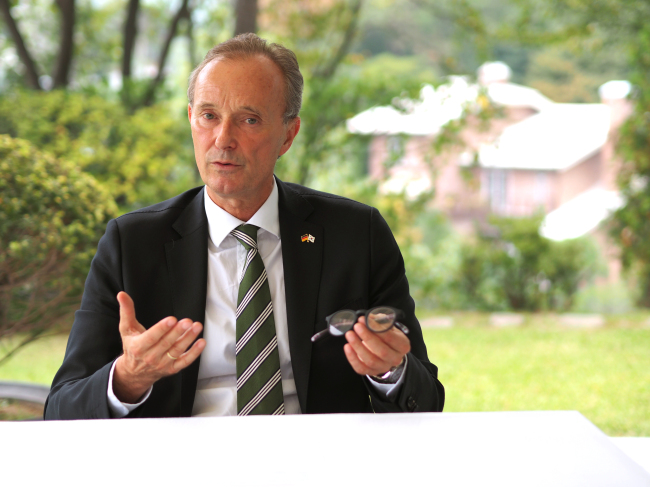 |
German Ambassador to Korea Stephan Auer (Joel Lee/The Korea Herald) |
Deflecting concerns that Germany will be more inward-looking as a result of the election, Auer asserted that there was still plenty of potential for further enhancing collaboration with Korea, especially in the fourth industrial revolution sector, energy transition and educational and economic reform, among others.
The Day of German Unity commemorates the anniversary of national reunification in 1990, when the goal of a united Germany that originated in the mid-19th century was realized again.
“Whereas the Korean Peninsula’s division is ongoing over seven decades, the separation between East and West Germany was four decades long. There were constant exchanges between East and West Germans through Willy Brandt’s Ostpolitik, which gave people a vision of where they wanted to go forward,” noted Auer.
“Our reunification happened because the East Germans stood up against the communist dictatorship and demanded democratic and economic freedom. It was difficult to stop people’s aspiration that was set in motion. Externally, the decline of the Soviet Union also created a favorable environment for thawing tensions.”
Since the reunification, Germany’s political and economic weight has grown substantially in Europe and the world, said the diplomat, claiming his country has also assumed more global responsibilities.
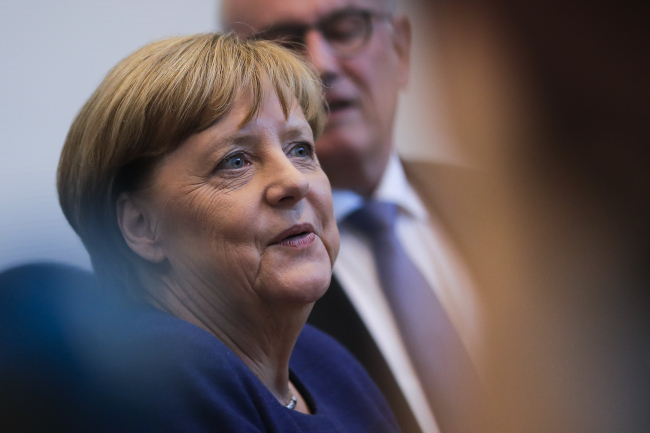 |
Angela Merkel, German chancellor and chairwoman of Christian Democratic Union party (AP Photo/Markus Schreiber) |
“In order to live up to our responsibilities as expected by the international community, we have played a key role in the Iran nuclear deal and Ukraine crisis,” the envoy highlighted, citing the Joint Comprehensive Plan of Action agreed and implemented since 2015 under the auspices of the “P5+1” countries of China, France, Russia, United Kingdom, United States plus Germany and the European Union, as well as Germany’s diplomatic intervention in the wake of Russia’s armed takeover of Crimea to fulfill the peace accord agreed in Minsk in 2015.
In addition, he said, Germany has carried out numerous peacekeeping and security operations around the world, including the conduct of reconnaissance, monitoring and surveillance of illegal crossings in the Aegean sea in the aftermath of the migration crisis; the deployment of 980 soldiers in Afghanistan -- the second-largest contingent -- as part of the North Atlantic Treaty Organization’s Resolute Support mission; and the second-largest contribution to NATO’s Kosovo force with 550 troops deployed there for Kosovo’s peace and security.
But Auer stressed that Germany was more of a facilitator rather than a heavyweight in interventional affairs, and that cooperating with close allies like Korea is fundamental to actualizing common objectives. Germany is aiming for a nonpermanent seat on the United Nations Security Council for 2019-20.
Twenty-seven years has passed since the historic event in Berlin, and Germany has gone a long way bridging its East-West divide and integrating newcomers into the fold of its society, observers say. The political and institutional integration occurred first, with Merkel and former German president from 2012-17, Joachim Gauck, both of whom hail from East Germany, being the “living proof” of German political unity.
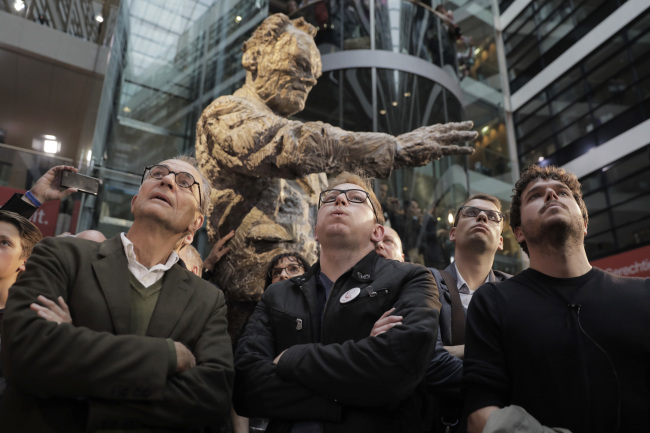 |
A statue of late chancellor Willy Brandt (1913-92) is seen in the background as people react to the first preliminary results at the headquarters of the Social Democratic party in Berlin, Germany, Sunday, Sept. 24, 2017, after the polling stations for the German parliament elections had been closed. (AP Photo/Gero Breloer) |
“Forty years of separation means that we need another 40 years to integrate and overcome remaining challenges,” Auer said. He acknowledged extant discrepancies in the quality of economic and social life between the former two regions. “It is an ongoing process. We have also had economic success stories coming from regions in East Germany, particularly Saxony-Anhalt.”
In Germany, where vociferous calls for nationalism have generally been taboo, people have proudly celebrated their regional and local identity, a legacy of its decentralized power. Since joining the European Union -- whose roots lie in the European Coal and Steel Community established in 1952 -- Germans have cherished their European identity, he explicated.
“Europe is our future. Our history has taught us that we need to work closely together with our European partners,” he underlined, saying friendship and reconciliation with the Poles, French, Czechoslovakians, Soviet Russians and others “whom we conquered and brought so much suffering to” was possible by their acceptance of Germany’s olive branch.
Noting Germany belongs to all major EU associations -- chiefly the single market, European Economic Area, eurozone and Schengen Area -- Auer said Berlin is committed to further strengthening European integration, a goal shared by the French administration under President Emmanuel Macron.
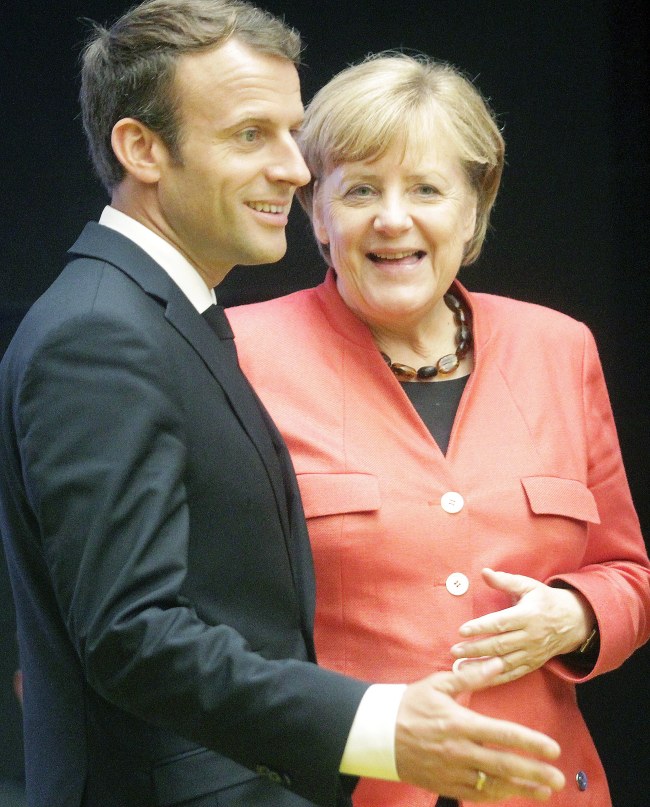 |
German Chancellor Angela Merkel (right) and French President Emmanuel Macron at the Tallinn Digital Summit in Tallinn, Estonia, 29 September 2017. The Tallinn Digital Summit is a platform to launch high-level discussions on further plans for digital innovation with the aim of keeping Europe ahead of the technological curve while becoming a digital leader, globally, in the years to come. (EPA/VALDA KALNINA) |
Germany and Korea had a trade turnover of $30 billion last year, with Korea registering a trade deficit of $11.3 billion, according to the Federal Statistical Office of Germany. Currently, some 500 German companies operate in the Korean market creating more than 100,000 jobs.
“Korean and German companies do compete in many areas, but our economies are also complementary in many ways,” Auer said. “We can work together for mutual benefit in the automobile sector, particularly in the electronic and autonomous vehicles, renewable energy transition and the fourth industrial revolution. We can shape industrial standardization processes through partnership arrangements.”
Germany’s vocational schools offer over 400 different training programs for jobs, combining theory and practice for flexible application in the future’s economy. The education sector has also launched a platform to discuss and prepare for upcoming disruptive changes with all stakeholders.
Germany, once called the “sick man of Europe” for its economic lethargy, has been able to rebound and recoup competitiveness following a series of reforms under former Chancellor Gerhard Schroder. In the late 1990s, the foreign press often labeled the sputtering German economy with this term, the consequence of astronomical reunification costs in estimate of over 1.5 trillion euros. The identification continued into the early 2000s, when the German economy entered a recession in 2003.
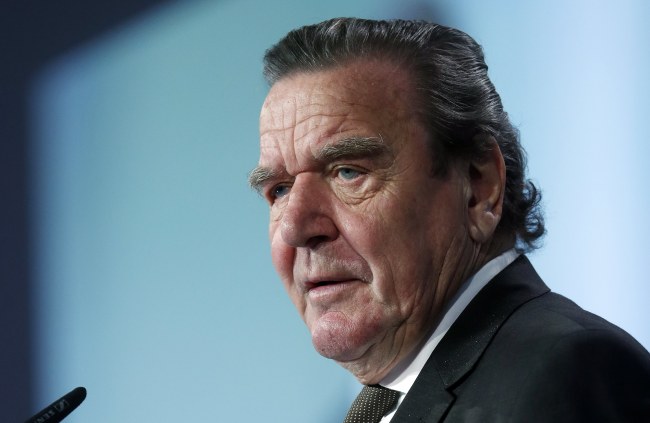 |
Former German Chancellor Gerhard Schroeder during his speech at the annual meeting of the German Insurance Association (GDV) in Berlin, Germany, 27 September 2017. Schroeder was elected chairman of the board of Russian state-owned oil company Rosneft on 29 September 2017. (EPA/FELIPE TRUEBA) |
Schroder, who visited Korea in early September, executed the now-celebrated Hartz Reform, a set of recommendations to reform the German labor market in 2002, named after the reform committee’s head, Peter Hartz.
“The set of reforms made our economy much healthier and more competitive, and brought down unemployment,” the ambassador explained, adding the initiative targeted social welfare, labor market, health care and pension and corporate taxation.
The crux of the reform centered on making the labor market more flexible and social welfare system more efficient. By introducing more part-time work and short-term contracts, it made it easier for companies to hire and entrepreneurs to launch new businesses. Redundancy payments and benefits to the unemployed were trimmed down. The state pension fund was supplemented by a system of private pension funds, and the retirement age was increased to 67. Public coverage of health care services was reduced.
“All in all, the reforms made German companies more competitive, helping them grow and employ more people. This brought down unemployment and increased consumers’ purchasing power, unleashing a virtuous cycle that lifted our economy out of recession.”
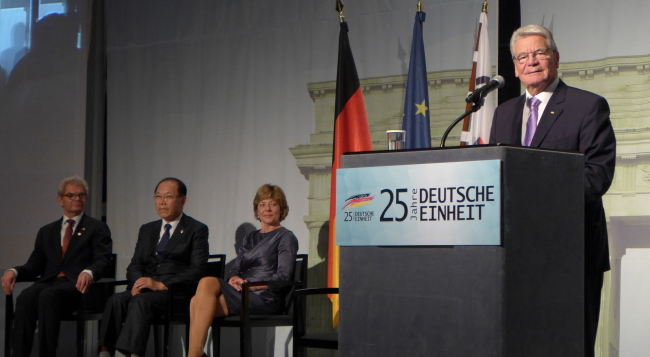 |
Former German President Joachim Gauck (right) speaks to guests at a reception marking the 25th anniversary of German reunification at Grand Hyatt Seoul in October, 2015. Also in the picture are former German Ambassador Rolf Mafael (left), now serving in Kazakhstan, former Education Minister Hwang Woo-yea and the president’s spouse, Daniela Schadt. (Joel Lee/The Korea Herald) |
Since the 2008 global financial crisis, the government has provided subsidies to companies to keep their employees, rather than fire them.
Auer highlighted the success of German small and medium-sized enterprises, which generate more than half of annual economic output and employ over 60 percent of the workforce. With 99 percent of companies being SMEs, they are the “backbone of the competitive, flexible and resilient Germany economy,” he said.
The SMEs work within an ecosystem of free and fair competition with large corporations under the watchful eye of the Federal Cartel Office, Germany’s national competition regulator.
“There is a good balance between large corporations and SMEs in Germany,” according to the diplomat. “The Federal Cartel Office ensures that the rules of free market are respected and enforced without powerful companies domineering others. It’s about levelling the playing field.”
By Joel Lee (
joel@heraldcorp.com)













